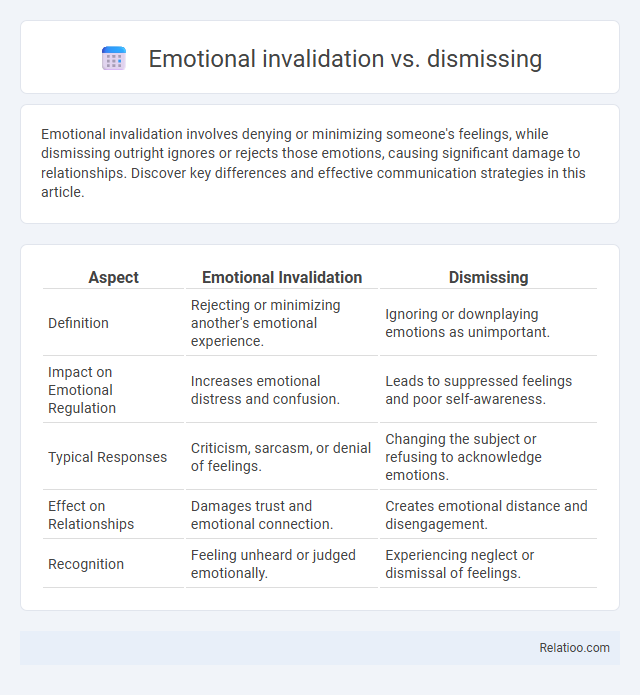Emotional invalidation involves denying or minimizing someone's feelings, while dismissing outright ignores or rejects those emotions, causing significant damage to relationships. Discover key differences and effective communication strategies in this article.
Table of Comparison
| Aspect | Emotional Invalidation | Dismissing |
|---|---|---|
| Definition | Rejecting or minimizing another's emotional experience. | Ignoring or downplaying emotions as unimportant. |
| Impact on Emotional Regulation | Increases emotional distress and confusion. | Leads to suppressed feelings and poor self-awareness. |
| Typical Responses | Criticism, sarcasm, or denial of feelings. | Changing the subject or refusing to acknowledge emotions. |
| Effect on Relationships | Damages trust and emotional connection. | Creates emotional distance and disengagement. |
| Recognition | Feeling unheard or judged emotionally. | Experiencing neglect or dismissal of feelings. |
Understanding Emotional Invalidation
Emotional invalidation occurs when a person's feelings are ignored, rejected, or judged as wrong, undermining their emotional experience. Dismissing, a form of emotional invalidation, specifically involves belittling or trivializing someone's emotions, often by telling them to "calm down" or "get over it." Understanding emotional invalidation is crucial for recognizing its impact on mental health, as it can lead to confusion, low self-esteem, and difficulties in emotional regulation.
What Does It Mean to Dismiss Emotions?
Dismissing emotions means rejecting or minimizing how you or others feel, often by telling yourself or someone else that those feelings aren't important or valid. Emotional invalidation occurs when emotions are ignored, belittled, or judged, leading to a lack of acknowledgment and support. Recognizing the difference helps you address your feelings healthily, ensuring emotional experiences are respected rather than dismissed or invalidated.
Key Differences: Emotional Invalidation vs. Dismissing
Emotional invalidation occurs when Your feelings are rejected, ignored, or judged, leading to diminished emotional expression and self-worth, while dismissing focuses on minimizing or ignoring emotions as unimportant or irrelevant. The key difference lies in invalidation actively shutting down emotional experiences and dismissing downplaying their significance without necessarily rejecting them outright. Understanding these distinctions helps improve empathy and communication in relationships by validating emotions rather than trivializing or negating them.
Signs You’re Experiencing Emotional Invalidation
Experiencing emotional invalidation can manifest through signs like feeling ignored, belittled, or told your emotions are "not a big deal," which reduces your feelings to being unimportant. Dismissing emotions often involves statements that downplay your experience, such as "You're overreacting" or "It's not that serious," causing frustration and self-doubt. Recognizing these signs helps differentiate emotional invalidation from healthy emotional support and encourages seeking validation for your genuine feelings.
Common Behaviors That Dismiss Emotions
Common behaviors that dismiss emotions include minimizing feelings, changing the subject, or offering unsolicited advice instead of empathetic listening. Emotional invalidation occurs when your emotions are labeled as wrong or exaggerated, leading to feelings of confusion and isolation. Dismissing emotions often results in reduced emotional expression and difficulty in forming authentic connections.
The Psychological Impact of Emotional Invalidation
Emotional invalidation and dismissing both undermine your feelings, but emotional invalidation explicitly rejects or negates your emotions, intensifying psychological harm such as increased anxiety, depression, and decreased self-worth. Dismissing minimizes or ignores your feelings, leading to confusion and emotional distancing that impairs healthy emotional processing. The psychological impact of emotional invalidation involves long-term effects on emotional regulation, self-esteem, and relational trust, emphasizing the importance of validation in mental health.
Why Do People Invalidate or Dismiss Emotions?
People often invalidate or dismiss emotions due to a lack of emotional awareness or discomfort with vulnerability, leading to misunderstandings in communication. Your experiences of emotional invalidation can stem from others minimizing your feelings to avoid dealing with their own emotional discomfort or social conditioning that discourages emotional expression. Recognizing these patterns helps improve emotional intelligence and fosters healthier, more validating relationships.
Emotional Invalidation in Relationships
Emotional invalidation in relationships occurs when one partner consistently ignores, rejects, or minimizes the other's feelings, leading to reduced emotional trust and increased conflict. Unlike dismissing, which involves outright ignoring or avoiding emotional expression, emotional invalidation subtly undermines feelings, causing confusion and emotional distress. Understanding and addressing emotional invalidation improves communication, strengthens emotional bonds, and fosters healthier, more supportive relationships.
How to Respond to Emotional Invalidation or Dismissal
When you face emotional invalidation or dismissal, prioritize validating your own feelings and expressing them calmly to the other person. Use clear, assertive communication to set boundaries and explain how their response affects you emotionally. Seek support from trusted friends or professionals who can affirm your experiences and help reinforce your emotional well-being.
Building Emotional Validation Skills
Building emotional validation skills involves recognizing and accepting others' feelings without judgment, which fosters trust and healthy communication. Emotional invalidation dismisses or minimizes emotions, often leading to feelings of rejection or misunderstanding. Differentiating between dismissing--an act of ignoring or belittling emotions--and emotional invalidation is crucial for developing empathy and supportive interactions.

Infographic: Emotional invalidation vs Dismissing
 relatioo.com
relatioo.com